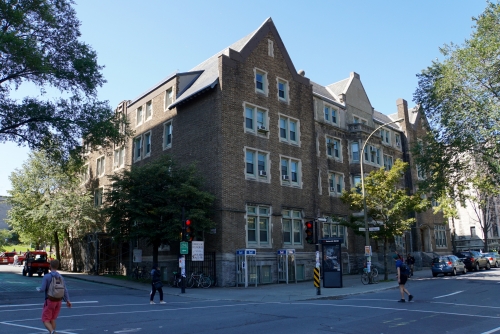Social work students will participate in a strike against mandatory unpaid internships Nov. 19-23. The Social Work Student Association (SWSA) had previously voted at their Oct. 24 General Assembly to join undergraduate student associations at UQAM and Université de Montréal in demanding internship remuneration from the provincial government. In solidarity, the McGill School of Social Work (SSW) had intended on cancelling classes on Nov. 19-23, but is legally bound to maintain classes.
SWSA has been planning the strike since the beginning of the semester and had previously supported the Feb. 20 Global Intern Strike that called on employers to pay their interns.
U2 and U3 students enrolled in the BSW program are required to complete 200 hours of unpaid field placement work for 3 credits each year. According to Jacqueline Ohayon, SWSA activities coordinator, many BSW students work unpaid for 16 hours per week in addition to completing a full course load. She believes that unpaid internships widen the wage gap and are inaccessible to marginalized groups.
“The fields that have unpaid internships are not only women-dominated but are [also] care-centered,” Ohayon said. “The narrative that people [in social work] are made for self-sacrifice […] has to be fought, and [the misconception shows that] society doesn’t value and doesn’t care about our profession.”
SWSA hopes that the Quebec Ministry of Education can compensate students for their work and establish labour standards for internships that are part of a degree program. Quebec’s Act Respecting Labour Standards protects only employees and paid interns by enforcing minimum acceptable working conditions on wage, length of a workweek, vacation time, and psychological harassment. Ohayon explained that the absence of an overarching policy about workplace standards puts unpaid interns at risk.
“All the conditions of the intern lie in the hands of [authorities such as the] field supervisor, field director, professor, [or] seminar professor,” Ohayon said. “There are a lot of people who were asked to be closeted during field placements because [their supervisors] said that [revealing one’s sexual orientation] was not appropriate.”
At the Nov. 14 SSW faculty meeting, the teaching faculty unanimously voted to cancel classes Nov. 19-23 in favour of extra classes in December or additional assignments. However, the McGill administration has since reminded teachers of their duty to follow the schedule.
“Teaching faculty support the concerns of the students, but we do have a requirement to teach classes, both as part of our legal requirements and with respect to the requirement [to provide instruction],” Nico Trocmé, director of the School of Social Work, said. “Any student who requests class is entitled to have class.”
Trocmé still expressed support for students participating in the strike and hopes that the Ministry of Education can relieve their financial burden.
“The School [of Social Work] has no funds to pay for internships, and many of the community agencies that students do their internships in have very limited budgets,” Trocmé wrote in an email to The McGill Tribune. “Not only would [financial compensation for internships] relieve some pressure on students who have to assume part-time jobs or go into debt, but it would also […] attract students who, otherwise, cannot afford to obtain a professional degree and help increase the diversity of students in our programs.”
Students in most programs will not need to schedule extra field hours. Masters in Couple and Family Therapy studies must make up for missed internship hours because the Ordre des travailleurs sociaux et des thérapeutes conjugaux et familiaux du Québec has strict accreditation standards for their program. SSW is currently trying to negotiate for fewer field placement requirements with accreditation organizations for social work programs.
Theresa*, U1 Arts, supports the strike and believes that either the government or the agencies should pay for students’ work.
“If you want students to spend time, energy, and money on a certain cause, they must be remunerated,” Theresa said. “Time spent on these placements is money lost.”
*Name has been changed at the request of the source.








